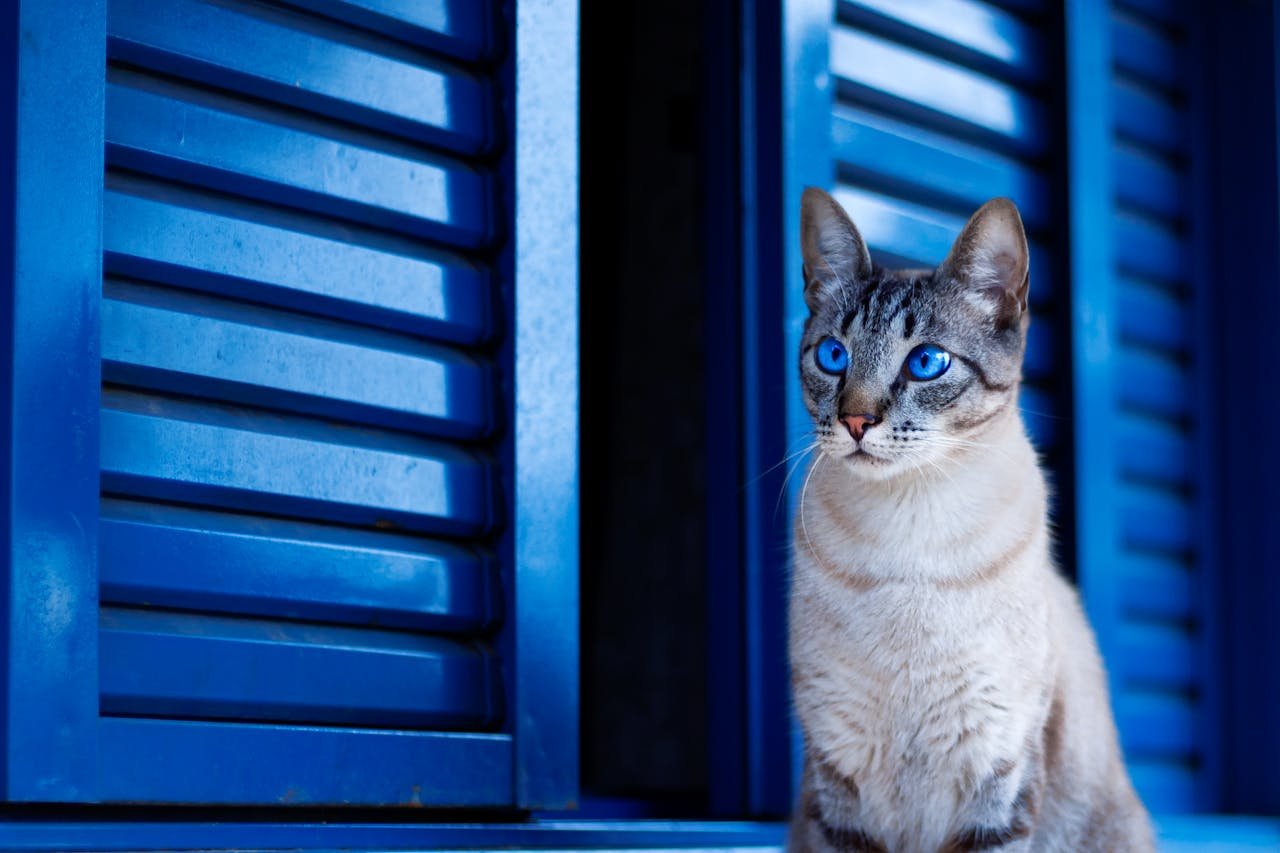Feeding Rice Cakes to Cats – Can Cats Eat Rice Cakes? A Complete 2025 Guide to Safety, Nutrition, and Better Alternatives
Can cats eat rice cakes? Yes—technically, a small bite of plain, unsalted rice cake is unlikely to cause harm, but that doesn’t make it a healthy or recommended choice for your feline friend. In 2025, when pet owners are more informed than ever about animal nutrition, it’s important to look beyond the “safe or unsafe” question and consider what truly benefits a cat’s diet. Rice cakes, made primarily from puffed rice, offer none of these critical nutrients, making them nutritionally empty for cats.
While humans may enjoy rice cakes as a light, low-calorie snack, they hold little to no value for feline health—and in some cases, they can pose hidden risks. Many flavored rice cakes contain salt, sugar, artificial additives, onion powder, or garlic powder, all of which can be harmful or even toxic to cats in small quantities. Even when plain, rice cakes can cause mild digestive upset, bloating, or discomfort due to their dry texture, and they may act as a choking hazard if given in large pieces. More importantly, feeding rice cakes regularly can contribute to an unbalanced diet, replacing nutrient-rich treats with empty calories.
From a responsible pet care perspective, rice cakes should be viewed as a rare novelty, not a staple or frequent reward. If your cat is intrigued by your snack, it’s far better to offer species-appropriate alternatives that align with their natural dietary needs. Options like small pieces of cooked, unseasoned chicken or turkey, freeze-dried pure meat treats, or specially formulated dental chews can satisfy curiosity while delivering real nutritional benefits. These choices not only taste better to your cat but also support muscle health, coat quality, and overall vitality.
In short, feeding rice cakes to cats is possible in tiny, plain portions without causing immediate harm—but it doesn’t contribute to their long-term health. As a caring pet owner in 2025, the smarter approach is to stick to protein-rich, meat-based snacks that mirror what your cat’s body is designed to process. By doing so, you’ll keep them healthy, happy, and purring for the right reasons—while enjoying your rice cakes guilt-free.
Related Post: Can Cats Eat chicken gizzards Safely? 2025 Expert Breakdown
Can Cats Eat Rice Cakes?
Yes—cats can eat rice cakes, but that doesn’t mean they should. Rice cakes are not toxic to cats and contain no inherently poisonous ingredients, so a small nibble is unlikely to cause harm. However, they offer no meaningful nutritional benefit to a feline’s diet. The most basic rice cakes are made from just one ingredient—puffed rice—either white or brown, dried and baked. While this makes them a harmless snack for humans, it also makes them nutritionally empty for cats, who are obligate carnivores and thrive on protein-rich, meat-based diets.
Flavored rice cakes raise more concerns. Many contain salt, sugar, artificial additives, or spices—including onion or garlic powder—that can be harmful or even toxic to cats in small amounts. Even without these dangerous extras, the dry, airy texture of rice cakes can cause mild digestive upset, bloating, or discomfort if consumed in more than tiny pieces. For these reasons, rice cakes should be treated as an occasional curiosity, not a regular snack.
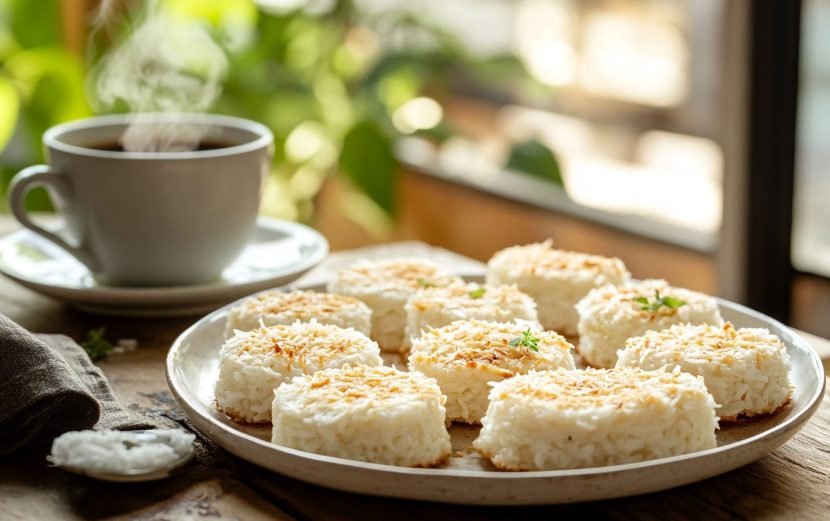
Can Cats Eat Rice?
Yes—cats can eat rice in small, occasional amounts.However, it’s not an essential part of a feline’s diet, and too much can displace the protein-rich foods they truly need to stay healthy. While rice is safe, it should be viewed as a filler rather than a nutrient-rich ingredient for cats. If your cat already eats a complete and balanced commercial diet, adding rice won’t provide any additional health benefits—and in excess, it can even reduce the nutritional value of their overall meals.
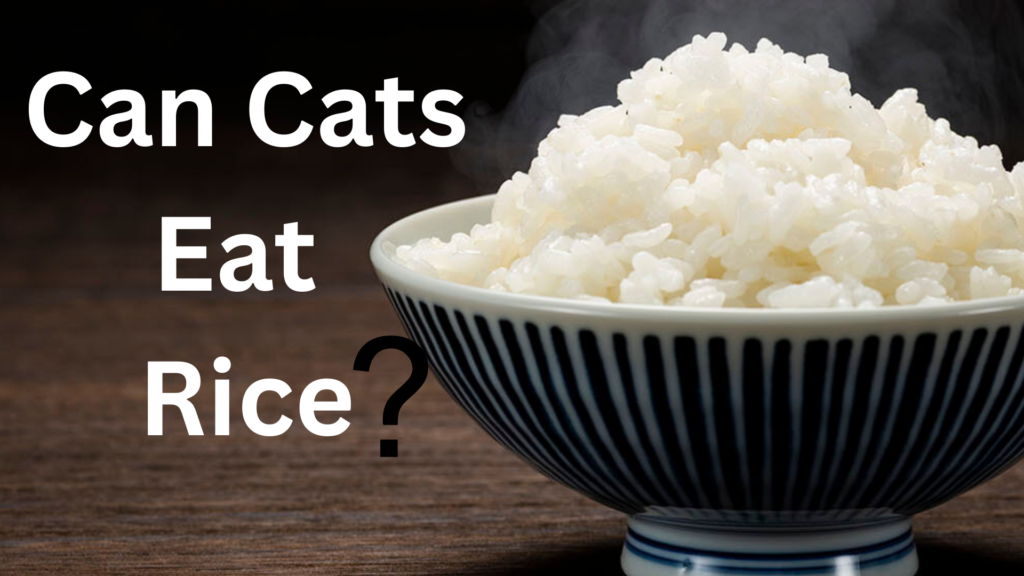
Both white rice and brown rice are popular in human diets, and each has its merits. Brown rice retains more natural fiber and nutrients, while white rice—though processed—still contains vitamins and minerals, making it easier to digest. For cats, however, the choice between white or brown rice isn’t about health benefits but about moderation and preparation. The safest way to offer rice to your cat is to boil it plain, without adding salt, butter, onion, garlic, or spices, as these can be harmful or even toxic to felines.
Why Rice Cakes Are Not a Good Choice for Cats
No Real Nutritional Value
Even the healthiest-looking rice cake — plain, sodium-free, and unflavored — has no vitamins, minerals, or amino acids that cats require. Unlike a piece of chicken or fish, a rice cake doesn’t nourish your cat’s body in any way. Feeding them regularly means adding unnecessary carbohydrates to their diet without offering any health benefits, which can contribute to gradual weight gain and digestive imbalance.
Excessive Carbohydrates Can Upset Digestion
Their digestive systems are built for breaking down proteins and fats, not starch-heavy foods. Consuming too much rice can lead to bloating, discomfort, vomiting, or diarrhea. Over time, an imbalanced diet that leans toward carbs can affect metabolism and overall vitality.
Hidden Sodium Risks
Many rice cakes, even ones marketed as “healthy snacks,” contain added salt. Cats have a much lower sodium tolerance than humans, and excessive intake can lead to sodium ion poisoning. Early symptoms include lethargy, vomiting, excessive thirst, and loss of coordination. Severe cases can result in tremors, seizures, or even organ failure. While sodium-free rice cakes exist, most cats find them unappealing — making the risk of flavored varieties even greater.
Flavors, Sweeteners, and Coatings Can Be Harmful
Rice cakes with added flavors such as cheese, onion, garlic, caramel, or chocolate are especially dangerous. Onion and garlic powders can damage red blood cells and lead to anemia, while chocolate contains theobromine, which is toxic to cats even in tiny amounts. Sweet coatings or artificial sweeteners can also trigger digestive distress and contribute to obesity or diabetes.
Healthier and Safer Alternatives in 2025
If you want to share a snack with your cat, there are far better and safer options that align with their natural dietary needs. Small pieces of plain, cooked chicken or turkey, freeze-dried meat treats, or specially formulated cat snacks recommended by veterinarians are excellent choices. These alternatives not only satisfy your cat’s curiosity but also support muscle strength, healthy skin, a shiny coat, and overall well-being.
By choosing nutritionally appropriate treats, you can ensure your feline friend enjoys both a tasty reward and the long-term health benefits that come with a balanced, species-appropriate diet.
Do Cats Like Rice Cakes?
Most cats show little to no interest in rice cakes, especially when they are plain and sodium-free. As obligate carnivores, cats are instinctively drawn to the scent and texture of meat rather than bland, carbohydrate-heavy snacks like rice cakes. A plain puffed rice disc simply doesn’t offer the rich aroma or flavor profile that would naturally appeal to a feline palate.
That said, cats are curious creatures, and their interest often has more to do with what you are eating than with the food itself. If your cat sees you enjoying a rice cake, it might paw at it, sniff it, or take a small nibble out of sheer curiosity. This behavior is more about mimicking their human’s actions than a genuine craving for the snack.
It’s important to be cautious if your cat shows interest in flavored rice cakes. Varieties coated in cheese, onion, garlic, caramel, chocolate, or other seasonings can be harmful or even toxic to cats. Even a small lick of a seasoned or salted rice cake can introduce unnecessary sodium, artificial additives, or dangerous compounds into your cat’s system.
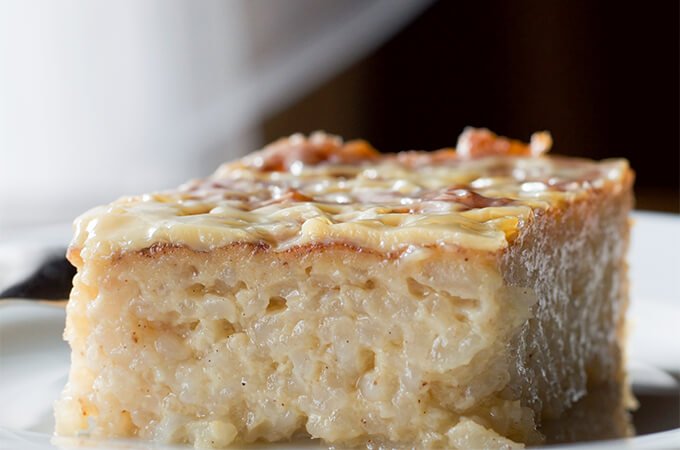
While there’s no harm in letting a cat sniff a plain, sodium-free rice cake, it’s best not to encourage the habit. Instead, you can offer your pet safe, protein-rich treats that satisfy their natural dietary instincts while keeping them healthy. In 2025, pet nutrition experts agree that high-quality, meat-based snacks — such as freeze-dried chicken or turkey — are far better options for rewarding your cat’s curiosity without compromising their health.
Should Cats Eat Rice Cakes? A Clear Breakdown
When it comes to sharing human snacks with your cat, rice cakes might seem harmless — but appearances can be deceiving. While they aren’t toxic, they also don’t offer anything your feline friend truly needs for health and longevity. To help you make the best choice, here’s what modern veterinary nutrition experts say:
- Not toxic, but nutritionally empty – A plain, unsalted rice cake won’t poison your cat, but it offers zero essential nutrients for feline health.
- Cats are obligate carnivores – Their bodies are built to thrive on protein-rich, meat-based diets with minimal carbohydrates.
- Lacks essential nutrients – Rice cakes contain no amino acids, vitamins, or minerals cats need for muscle strength, immunity, and energy.
- Only empty calories – These snacks provide energy without nutrition, increasing the risk of unnecessary weight gain.
- Takes up valuable stomach space – Since cats have small stomachs, feeding nutrient-poor snacks means less room for essential proteins and fats.
- Long-term feeding risks – Frequent rice cake treats can displace healthier, species-appropriate foods, leading to deficiencies over time.
- 2025 expert advice – Veterinary nutritionists recommend treats that mimic a cat’s natural prey-based diet.
- Healthier treat alternatives – Freeze-dried meat, plain cooked chicken, or turkey are far better choices for promoting lean muscle, steady energy, and overall wellness.
Potential Hidden Risks of Rice Cakes for Cats
- May appear harmless but carry hidden risks – Rice cakes might look safe, but added ingredients can make them unsuitable for cats.
- Added sugar, salt, and seasonings – Many commercial rice cakes include these extras, which can upset a cat’s digestive system.
- Artificial flavors and preservatives – Ingredients safe for humans may cause vomiting, diarrhea, or lethargy in cats.
- Sodium strain – Even small amounts of salt can put pressure on a cat’s kidneys.
- Excess carbohydrates – Rice cakes contain empty calories that can lead to unnecessary weight gain.
- Lack of essential nutrients – Rice cakes have no taurine, high-quality protein, or healthy fats, all vital for feline health.
- Displaces real nutrition – Feeding rice cakes instead of protein-rich foods reduces intake of nutrients cats need.
- Expert advice (2025) – Veterinary nutritionists recommend only plain, unsalted rice cakes in very small portions, offered rarely.
- Avoid flavored or processed varieties – Rice cakes with sugar, salt, spices, or additives should never be given to cats.
- Better alternatives exist – Protein-rich treats like cooked chicken, turkey, or freeze-dried meat snacks are safer, healthier, and more satisfying for cats.
Always Check the Ingredients Before Sharing Rice Cakes with Cats
When it comes to your cat’s diet, reading the ingredients list is essential — especially with human snacks like rice cakes. While they may seem harmless, many varieties contain hidden ingredients that can be unsafe for felines. Salt, sugar, artificial flavors, or certain spices can cause digestive upset or even lead to more serious health issues. Human foods are not formulated to meet a cat’s unique nutritional needs, and rice cakes offer no real dietary value for them. Instead, stick to treats and meals specifically designed for cats, which provide the right balance of protein, taurine, and healthy fats.
If your cat accidentally eats a rice cake and begins showing signs of vomiting, diarrhea, lethargy, or unusual behavior, contact your veterinarian promptly. While a few crumbs from the floor may not cause harm, making rice cakes a regular treat is not recommended.
Too Much Salt Can Be Dangerous
Most store-bought rice cakes contain added salt, and even small amounts can be risky for cats. Felines require extremely low sodium levels in their diet, and consuming more than about 40 milligrams per day may put them at risk for sodium ion poisoning. Symptoms can include vomiting, loss of appetite, excessive thirst, increased urination, weakness, and disorientation. In severe cases, salt toxicity can lead to tremors, seizures, or even coma. This is why flavored or salted rice cakes should never be offered to your cat.
Excess Sugar and Sweet Varieties
Sweet rice cakes, such as caramel or chocolate-coated versions, should be kept far from your cat’s reach. While sugar itself is not acutely toxic to cats, it can cause stomach upset, contribute to obesity, and increase the risk of long-term conditions such as diabetes and heart disease. Chocolate rice cakes are particularly dangerous, as chocolate contains theobromine, a compound toxic to cats even in small doses.
Harmful Spices and Seasonings
Flavored rice cakes often contain seasonings like onion powder, garlic powder, oregano, or other herbs that are unsafe for cats. Onion and garlic — both members of the Allium family — can damage red blood cells, potentially causing anemia. Oregano, while harmless to humans, can lead to digestive upset or even liver irritation in cats. Even seemingly mild seasoning blends may contain ingredients your cat cannot tolerate, so plain, unseasoned food is always the safest choice.
In conclusion, while rice cakes are not directly toxic, they simply do not belong in a cat’s regular diet. The combination of low nutritional value and potential exposure to harmful additives makes them a snack best avoided. Choosing species-appropriate treats will not only protect your cat’s health but also ensure they’re getting the nutrients they need to thrive.
Related Post: Can Cats Have Mandarin Oranges? Expert Warnings 2025
Is Cooked Rice Good for Cats?
When it comes to feline nutrition, cooked rice is far from a necessity. Cats are obligate carnivores, meaning their bodies are designed to thrive on animal-based proteins, not plant-based carbohydrates. While plain, thoroughly cooked rice is not toxic to cats, it offers virtually no essential nutrients for their health. Feeding rice regularly can fill your cat’s stomach without providing the amino acids, vitamins, and minerals they truly need — potentially leading to nutrient imbalances over time.
If you do decide to share rice with your cat, keep portions extremely small, and ensure it is completely plain — no salt, butter, oils, seasonings, or sauces. Any added flavors could upset their stomach or introduce harmful substances. Rice should never replace a high-quality, meat-based diet or specialized feline treats designed for optimal health.
Why Raw Rice Is Dangerous for Cats
Raw rice is a different story — and one to avoid entirely. In large amounts, lectin can irritate the gastrointestinal tract, leading to symptoms such as vomiting, diarrhea, bloating, or abdominal pain. If your cat shows signs of discomfort for more than 24 hours after eating raw rice, it’s important to seek veterinary attention promptly.
Occasional Use Only
While a few bites of plain, cooked rice will not harm most cats, it should be viewed as an occasional filler rather than a treat with any real benefits. Your cat will always get more value — and better long-term health — from nutrient-rich, species-appropriate foods like lean meats, wet cat food, or vet-approved snacks.
Can Cats Eat Brown Rice Cakes?
At first glance, brown rice cakes may seem like a healthier option compared to white rice cakes because they retain the bran, husk, and germ, making them richer in fiber, vitamins, and minerals. However, for cats, this extra “human” nutrition doesn’t provide real benefits.
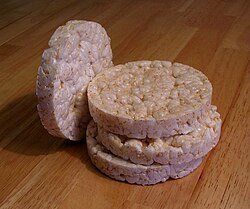
- Cats are obligate carnivores – Their bodies are built to digest animal protein, not plant-based fiber or complex carbohydrates.
- May cause digestive upset – Eating brown rice cakes can lead to bloating, diarrhea, or vomiting, especially if consumed in larger amounts.
- Empty calories – Despite the fiber and vitamins for humans, brown rice cakes provide no essential nutrients cats need, such as taurine or high-quality protein.
- Not a recommended treat – Offering brown rice cakes can displace protein-rich foods that are vital for a cat’s overall health.
Another issue is that brown rice cakes provide energy in the form of carbohydrates, which cats simply don’t need in significant quantities. Since they cannot efficiently utilize plant-based nutrients, any calories from brown rice cakes are essentially “empty” in terms of feline nutrition.
Can Cats Eat Chocolate Rice Cakes?
Absolutely not — cats should never eat chocolate rice cakes or any chocolate-flavored product.Even in small amounts, these stimulants can cause serious health issues by affecting the heart, nervous system, and kidneys.
Following chocolate consumption, a cat may start showing symptoms within hours, such as:
- Vomiting and diarrhea
- Rapid heartbeat
- Restlessness or hyperactivity
- Tremors or muscle stiffness
- Increased body temperature
- Difficulty breathing
- Weakness or collapse
If you suspect your cat has eaten chocolate, treat it as a veterinary emergency. Immediate medical attention can be lifesaving.
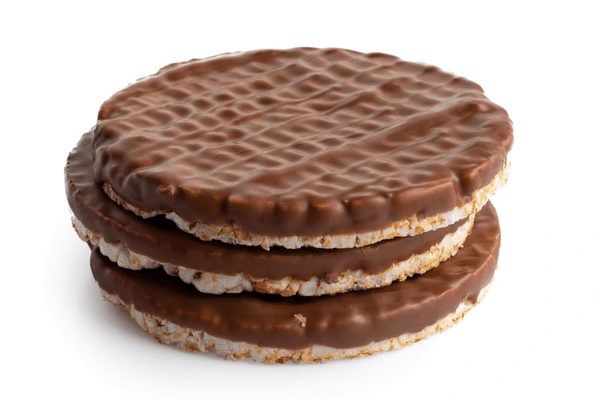
Aside from the toxic effects of chocolate, chocolate rice cakes are also loaded with sugar and fat — both of which cats cannot digest efficiently. Excess sugar contributes to obesity, gastrointestinal upset, and an increased risk of feline diabetes.
Can Cats Eat Cinnamon Rice Cakes?
Cinnamon rice cakes might seem like a light, harmless snack for humans, but for cats, they can be a hidden source of trouble.When consumed in larger amounts, cinnamon can irritate your cat’s digestive system and potentially affect blood sugar regulation.
If a cat eats too much cinnamon, it may experience symptoms such as vomiting, diarrhea, low blood sugar, and general weakness. What many pet owners don’t realize is that the danger isn’t only in eating it — even inhaling cinnamon powder can be harmful. Cats have sensitive respiratory systems, and the fine particles from cinnamon-flavored rice cakes can cause coughing, wheezing, or labored breathing. Severe reactions may require immediate veterinary care.

Beyond the spice itself, cinnamon rice cakes often contain added sugar, artificial flavors, or sweetened coatings. These extras can lead to unnecessary weight gain, gastrointestinal upset, and long-term health issues like diabetes in cats. Since felines are obligate carnivores, their digestive systems are built to process meat-based proteins, not grains, sugar, or flavor additives.
What to Give Cats Instead of Cinnamon Rice Cakes
While a single lick of cinnamon rice cake is unlikely to cause severe harm, it offers no nutritional benefit and poses unnecessary risks. The safest approach is to avoid giving your cat cinnamon rice cakes entirely and instead offer feline-appropriate treats that align with their natural dietary needs.
Can Cats Eat Rice Cakes with Fruit?

Rice cakes are a light, crunchy snack enjoyed by humans for breakfast or as a quick bite, especially when topped with almond butter and fresh fruit. But what about sharing them with your curious feline friend?
- Plain, unsalted rice cakes are safe in small amounts – A tiny piece won’t harm your cat, but it shouldn’t replace their regular diet.
- Cat-safe fruits make an occasional treat – Blueberries, mango, papaya, and peach are safe for cats in moderation. These fruits provide antioxidants, hydration, and a little natural sweetness without harming your pet.
- Almond butter can be okay in moderation – Unsweetened, salt-free almond butter without artificial additives offers healthy fats, vitamins, and minerals that can support digestion and overall wellness.
- Avoid harmful additions – Never use almond butter with sugar, salt, chocolate, or xylitol, as these can be toxic to cats.
Key takeaway: Rice cakes with fruit can be a fun, occasional treat for cats when offered in tiny amounts and prepared safely. Stick to plain rice cakes and cat-safe fruits to provide a novel snack without compromising your cat’s health.
Fruits and Toppings to Avoid
Not all fruits are safe for cats. Steer clear of:
- Grapes and raisins (toxic to cats)
- Cherries (contain harmful pits and cyanide compounds)
- Any fruit with added sugar or syrups
Key Feeding Tips
- Serve only tiny, bite-sized portions.
- Offer rice cakes with fruit as an occasional snack — not a daily diet item.
- Always remove seeds, pits, or skins that may be harmful.
Are There Any Reasons a Cat Should Eat Rice Cakes?
When it comes to feline nutrition, rice cakes aren’t exactly a superfood for cats — but they aren’t inherently harmful either. In fact, there are a few situations where plain, unflavored rice cakes might have minor benefits for your furry friend.
1. A Gentle Source of Fiber
Rice contains a small amount of dietary fiber, which can help keep your cat’s digestive system running smoothly. Fiber adds bulk to their food, supporting healthy bowel movements and potentially easing mild constipation.
2. Low-Calorie Snacking Option
For overweight cats, plain rice cakes can be a light, low-calorie alternative to more fat-heavy treats. Since they’re airy and filling, they might help your cat feel satisfied without adding unnecessary calories.
3. A Simple, Bland Treat for Sensitive Stomachs
If your vet suggests bland foods for your cat due to mild stomach upset, tiny pieces of plain rice cake (free from salt, sugar, and flavorings) could be an easy-to-digest snack.
Final Thoughts: Can Cats Eat Rice Cakes?
While it may be tempting to share your snacks, can cats eat rice cakes? Technically yes, but only in very small, plain, unsalted portions. Rice cakes provide no essential nutrients for felines, offering empty calories that can disrupt a balanced diet and even contribute to digestive discomfort or weight gain over time.
Cats are obligate carnivores, meaning their bodies thrive on high-quality protein, taurine, and healthy fats—not grains or processed snacks. Even flavored or seemingly “healthy” rice cakes can hide salt, sugar, artificial additives, or spices that may be harmful to your cat.
For curious kitties, occasional tiny bites of plain rice cake won’t cause immediate harm. However, the smartest and safest choice is to stick to species-appropriate treats like freeze-dried meat, small pieces of cooked chicken or turkey, or vet-approved snacks.
In 2025, responsible pet care focuses on nutrition first. So, while a nibble here and there is unlikely to hurt, make sure your cat’s treats prioritize protein over puffed rice—keeping them healthy, happy, and thriving for years to come.
FAQs – Can Cats Eat Rice Cakes?
Are rice cakes safe for cats to eat?
Plain, unsalted rice cakes aren’t toxic, but they offer zero essential nutrients for cats and should only be given as an occasional tiny treat.
Why shouldn’t cats eat flavored rice cakes?
Flavored varieties often contain chocolate, cinnamon, sugar, or spices that can upset digestion or even be toxic, making them unsafe for felines.
Can cats digest brown rice cakes?
No. The high fiber and complex carbs in brown rice cakes are hard for cats to digest and may lead to bloating, diarrhea, or stomach discomfort.
What are the healthier alternatives to rice cakes for cats?
Protein-rich snacks like plain cooked chicken, turkey, or freeze-dried meat treats are safer and support muscle health, coat quality, and overall vitality.
Is it okay to give cats rice cakes with fruit?
Only certain cat-safe fruits like blueberries, mango, or papaya in very small amounts are safe. Avoid grapes, cherries, citrus, and sugary toppings.
For More Visits: SiameseMania
Also Read: Can Cats Eat Falafel Safely or Is It a Hidden Danger?

